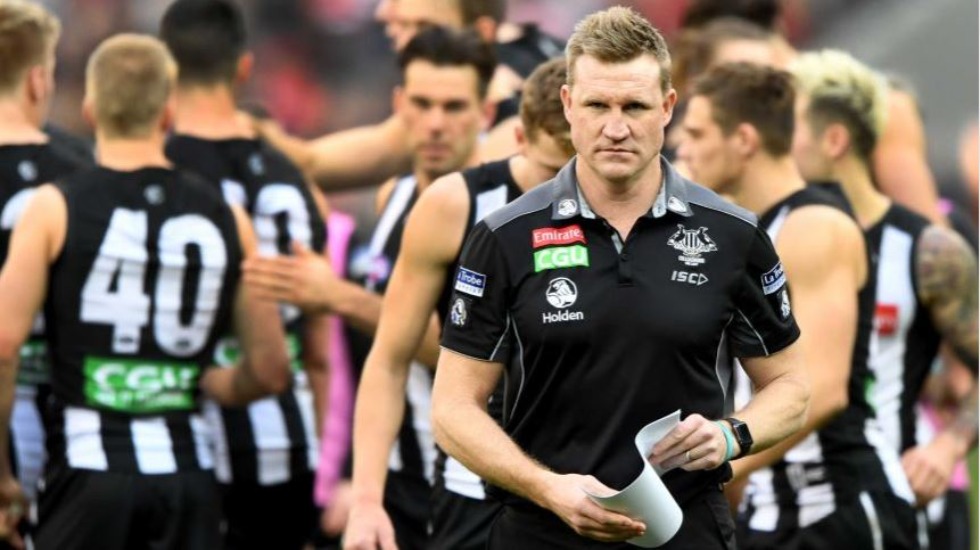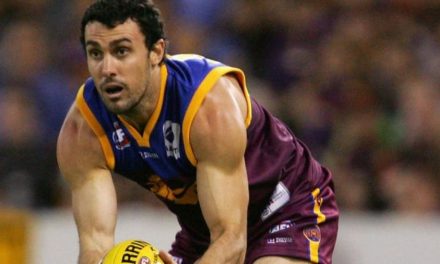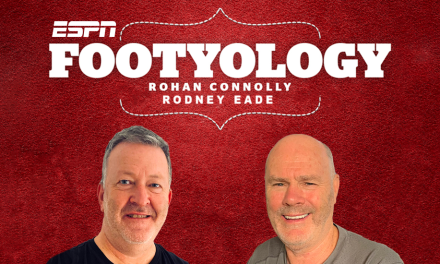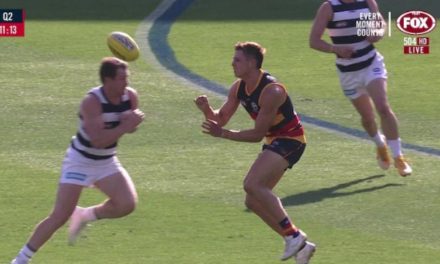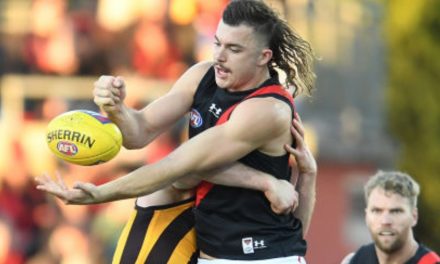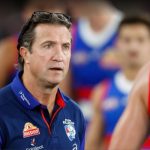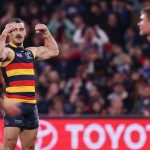Collingwood coach Nathan Buckley knows the road back to the Gabba has just become much tougher. Photo: AFL MEDIA
Nathan Buckley’s body language told the tale.
The Collingwood coach is widely regarded in media circles as one of the most genial and considered in his press conferences.
He also often wears his heart on his sleeve and, in this case, didn’t hide his disappointment as he trudged into the Gabba grandstand and slid into his seat.
It was squeezed into a cramped room between a sponsors’ backdrop and beaten-up trestle table, such is the state of the Gabba’s renovations right now. The AFL insists on-going works will be completed before the finals kick-off, but that’s another story.
Collingwood’s loss to Port Adelaide on Monday night ultimately consigned it to a road trip to face a West Coast side set to be bolstered by the return of several premiership players – including Luke Shuey, Jeremy McGovern and Jack Redden – for an elimination final.
And Buckley knew the road back to the Gabba on 24 October had just got a whole lot tougher.
“I really wanted to win tonight for the club, but also for ‘Pendles’,” Buckley said, referencing captain Scott Pendlebury breaking club records for overall games played (314) and games played as captain (162).
“It was disappointing not to get the job done. I don’t think it was a lack of effort or want, I just think we didn’t do the basics well enough and we went away from being predictable to one another more often than we would have liked.
“They’re two really clear areas for us. If we want to play our best footy, we’ve got to accept that it’s not going to be perfect, but we’ve got to come back to doing the basics well and playing more often as a unit in our roles.”
It had been the most intriguing sub-plot to the last home-and-away round.
West Coast always looked likely to finish the round where it started – in fifth spot. Whichever side sat eighth when the dust settled on Monday night would have to travel west.
For most sides pressing for one of the last remaining finals spots, the preference was obvious – stay in Queensland for an elimination final on neutral turf at the Gabba rather than travel west.
A long list of permutations was on the table. The Eagles ground their way past North Melbourne and Richmond brushed Adelaide aside. Geelong almost coughed up a top-four chance against lowly Sydney, but was saved by Patrick Dangerfield.
Collingwood and Port Adelaide slugged it out for three-and-a-bit quarters. But when Todd Marshall’s set shot floated through to give the Power enough breathing space in the final term, you could feel the distinctly pro-Collingwood crowd’s heart sink.
The Magpies now face the toughest and most daunting task of week one’s cut-throat elimination finals. Their last two games in Perth were defeats to West Coast and Fremantle. The Eagles smacked them 66 points, laying down a marker in the process.
“That was a significant loss and they’d be pretty confident coming up against us, I would have thought,” Buckley said.
But can we completely count out Collingwood? Not yet. The Magpies’ third-ranked defence conceded only two goals more than top-ranked Port Adelaide across 18 rounds this season.
West Coast’s recent form in Queensland has been mixed. Three wins, none of them overly convincing, and two losses amid a growing injury toll. But player availability is improving and the Eagles are a much different proposition in their own backyard.
What we might get is another finals classic between two clubs that have delivered one of the best September rivalries of the AFL era.
The back catalogue includes Peter Sumich’s miss in the famous drawn qualifying final of 1990, which had to be replayed, Mick McGuane’s infamous dropped mark and John Worsfold’s scathing response in 1994, the Pies’ epic extra-time win at Subiaco in 2007 and the Eagles’ enthralling come-from-behind grand final victory two years ago, sealed by one of the great match-winning plays and goals.
Hopefully this year we’ll get more of it in October. Whether Collingwood’s trip west is a finals death sentence, as many of us thought it would be, remains to be seen.

